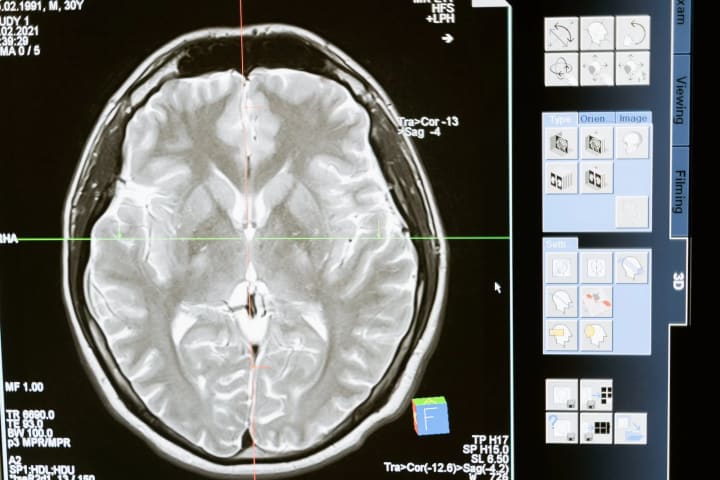
Before I start the article, I will take your time and introduce my books to you. My first book "The Power of Positive Thinking: Rewiring Your Brain for Happiness and Success" is a self-help and personal development type book that tells you the beauty of positive thinking. My second book, "War and Society: An Overview of How Conflict Shapes Our World", tells you how the psychology of war affects society. You can find the link of the first book in this article, and the link of the second book in this article. Thank you very much for your support and I wish you a good reading.
1. Artificial intelligence and machine learning:
Artificial intelligence (AI) and machine learning (ML) are rapidly developing fields that have the potential to revolutionize the way we live and work. AI refers to the simulation of human intelligence in machines, allowing them to perform tasks that typically require human-like intelligence, such as understanding natural language, recognizing images, and making decisions. Machine learning is a subset of AI that involves the use of algorithms and statistical models to enable machines to learn from data and improve their performance over time.
There are many different types of AI and ML, including supervised learning, unsupervised learning, and reinforcement learning. Supervised learning involves training a model on a labeled dataset, where the desired output is already known, and the model learns to make predictions based on that data. Unsupervised learning involves training a model on an unlabeled dataset, where the desired output is not known, and the model must identify patterns and structure in the data on its own. Reinforcement learning involves training a model to interact with an environment and learn through trial and error, based on feedback in the form of rewards or punishments.
There are many applications of AI and ML across various industries, including healthcare, finance, transportation, and more. In healthcare, AI and ML are being used to develop personalized treatments, analyze medical images, and detect diseases early. In finance, AI and ML are being used to identify fraud, optimize investment portfolios, and provide personalized financial advice. In transportation, AI and ML are being used to develop self-driving cars and optimize traffic flow.
However, AI and ML also raise ethical and societal concerns, such as the potential for bias and discrimination in algorithms, the impact on employment and the workforce, and the potential for autonomous weapons and surveillance. It is important for developers and policymakers to consider these issues and ensure that AI and ML are developed and used in a responsible and ethical manner.
Overall, AI and ML are rapidly developing fields with many potential applications and implications for society. With continued advancements in technology and research, the possibilities for AI and ML are endless.

2. Climate change and environmental issues:
Climate change refers to long-term changes in the Earth's climate, including rising global temperatures, changes in precipitation, and more frequent and severe weather events. These changes are largely caused by human activities, such as burning fossil fuels, deforestation, and agriculture. Climate change is a complex and pressing issue that has significant implications for the environment, human health, and the economy.
One of the most significant impacts of climate change is rising sea levels, which can lead to flooding, erosion, and the displacement of coastal communities. Climate change also increases the frequency and severity of extreme weather events, such as hurricanes, floods, and droughts, which can damage infrastructure, disrupt agriculture, and threaten human health.
To mitigate the impacts of climate change, many countries and organizations are working to reduce greenhouse gas emissions, which are the primary cause of climate change. This includes transitioning to renewable energy sources, such as wind and solar power, and implementing policies to reduce energy consumption and promote sustainability.
In addition to climate change, there are many other environmental issues that are of concern, including deforestation, loss of biodiversity, and pollution. Deforestation, or the clearing of forests for agriculture, logging, and other purposes, contributes to climate change and threatens the habitats of many species. Loss of biodiversity, or the decline in the variety and number of species in an ecosystem, also has significant implications for the environment and human well-being.
Pollution, both of the air and water, is another major environmental issue. Air pollution, primarily caused by the burning of fossil fuels and industrial processes, can contribute to respiratory problems and other health issues. Water pollution, caused by agricultural runoff, industrial waste, and other sources, can contaminate drinking water and harm aquatic ecosystems.
Overall, climate change and environmental issues are complex and pressing challenges that require global cooperation and action. By working together to reduce greenhouse gas emissions, promote sustainability, and protect the environment, we can help mitigate the impacts of climate change and create a more sustainable future for all.

3. Space exploration and astronomy:
Space exploration refers to the use of technology and science to explore space, including the study of planets, stars, and other celestial objects. Astronomy is the scientific study of these objects and their properties. Space exploration and astronomy have revolutionized our understanding of the universe and the place of humanity within it.
One of the most significant achievements in space exploration was the Apollo moon landings in the 1960s and 1970s, which demonstrated the ability of humans to travel beyond Earth and conduct scientific research in space. Since then, numerous space missions have been launched to study other planets, asteroids, comets, and other objects in our solar system.
In addition to exploring our own solar system, space exploration and astronomy have also led to discoveries about the universe beyond. Telescopes and other instruments have revealed the existence of countless galaxies, stars, and other celestial objects, and have provided insights into the origin and evolution of the universe.
Astronomy also plays an important role in our understanding of the Earth and its environment. Satellites and other instruments are used to study the Earth's atmosphere, oceans, and climate, and to monitor natural disasters and other environmental events.
However, space exploration and astronomy also present significant challenges and risks. Space travel can be dangerous and expensive, and the long-term effects of space travel on human health are still being studied. In addition, space exploration and astronomy raise ethical questions about the use of resources and the potential impact on other planets and celestial bodies.
Despite these challenges, space exploration and astronomy continue to be important fields of study and research, with new discoveries and advancements being made all the time. As technology continues to evolve and new missions are launched, we can expect to learn even more about our universe and our place within it.

4. Neuroscience and human consciousness:
Neuroscience is the scientific study of the nervous system, including the brain and spinal cord. It encompasses a broad range of disciplines, including biology, psychology, and medicine. One area of research within neuroscience that has gained significant attention in recent years is the study of human consciousness.
Consciousness refers to the subjective experience of being aware of one's surroundings, thoughts, and feelings. It is a complex and multifaceted phenomenon that has long puzzled scientists and philosophers. Advances in neuroscience have led to a better understanding of the neural basis of consciousness, including the role of specific brain regions and neural networks in generating conscious experiences.
One of the most significant findings in the study of consciousness is the idea of neural synchrony, or the coordinated firing of neurons across different brain regions. Research has shown that when different areas of the brain are in sync, it can lead to the integration of information and the generation of conscious experience.
Another area of research within neuroscience and consciousness is the study of altered states of consciousness, such as those induced by psychedelic drugs or meditation. These altered states can provide insights into the neural mechanisms underlying conscious experience and may have therapeutic potential for treating mental health disorders.
Despite significant advances in the study of consciousness, many questions remain unanswered. For example, it is still unclear how the brain generates subjective experience and how it relates to the physical world. Research in this area is ongoing, and new technologies and techniques are constantly being developed to study the brain and its functions.
Overall, neuroscience and the study of consciousness are important fields of research with significant implications for our understanding of the human mind and experience. By advancing our knowledge in these areas, we may be able to develop new treatments for mental health disorders and gain a deeper understanding of the nature of human consciousness.

5. Quantum computing and physics:
Quantum computing is a relatively new field of study that uses the principles of quantum physics to develop powerful new computing technologies. Unlike classical computing, which uses bits to represent data as 0s and 1s, quantum computing uses quantum bits (qubits) that can represent multiple states simultaneously. This allows quantum computers to perform certain calculations much faster than classical computers, potentially revolutionizing fields such as cryptography, drug discovery, and artificial intelligence.
The physics underlying quantum computing is based on the principles of quantum mechanics, which describes the behavior of particles on a very small scale. These principles include concepts such as superposition (the ability of a particle to exist in multiple states at the same time) and entanglement (the relationship between two particles that causes them to become correlated in their behavior).
Quantum computers use these principles to perform complex calculations much faster than classical computers. For example, a quantum computer could factor large numbers exponentially faster than a classical computer, which could have important implications for cryptography and cybersecurity. In addition, quantum computers could be used to simulate complex chemical reactions, potentially leading to new drug discoveries.
Despite the potential benefits of quantum computing, there are still significant challenges to overcome. For example, qubits are highly susceptible to environmental disturbances, which can cause errors in calculations. Researchers are working to develop new technologies and techniques to mitigate these errors and make quantum computing more practical.
In addition to quantum computing, the principles of quantum mechanics have important implications for many other areas of physics. For example, quantum mechanics has led to the development of new theories about the nature of particles and their interactions, such as quantum field theory and string theory. It has also led to the development of new technologies such as lasers and transistors.
Overall, quantum computing and physics are important fields of study with significant implications for a wide range of applications, from computing to energy to medicine. By continuing to advance our understanding of quantum mechanics and developing new technologies based on these principles, we may be able to unlock new possibilities and solve some of the world's most pressing problems.

6. Social justice and activism:
Social justice is a concept that refers to the idea of a fair and just society, where everyone has equal rights and opportunities regardless of their race, gender, ethnicity, or socioeconomic status. It involves a commitment to combating social inequality and promoting social change to address systemic issues of injustice and oppression.
Activism is the practice of advocating for social or political change. It involves taking action to promote a particular cause or issue, such as protesting, lobbying, or engaging in civil disobedience. Activism can take many forms, from grassroots movements to organized campaigns to social media advocacy.
Social justice and activism are closely intertwined, as activism often involves working towards social justice goals. Activists can help raise awareness of issues related to social justice, mobilize public support for change, and hold governments and other institutions accountable for addressing systemic inequality.
There are many different issues related to social justice that activists may focus on, such as racial justice, gender equality, LGBTQ+ rights, environmental justice, and economic justice. These issues are often interconnected, and addressing one issue may require action on multiple fronts.
Effective activism requires a commitment to ongoing learning and engagement with diverse perspectives. It also involves building coalitions and collaborating with others to achieve common goals. By working together, activists can create meaningful change and help build a more just and equitable society.
In recent years, social justice and activism have gained increased attention and support, particularly in response to high-profile incidents of police brutality and racial injustice. This has led to a renewed focus on issues related to systemic racism and inequality, as well as increased calls for action and reform.
Overall, social justice and activism are important concepts that can help drive meaningful change and address systemic issues of inequality and injustice. By working together and taking action, we can help build a more just and equitable society for all.

7. Cybersecurity and online privacy:
Cybersecurity refers to the practice of protecting computer systems and networks from unauthorized access or attack. This includes protecting against theft, damage, or unauthorized access to sensitive information, such as financial or personal data. Cybersecurity is an increasingly important issue in the modern world, as our lives become increasingly reliant on digital technology.
Online privacy is related to cybersecurity, but specifically refers to the protection of personal information online. This includes sensitive information such as passwords, financial data, and personal identity information. Online privacy is important because personal data can be used for malicious purposes, such as identity theft or financial fraud.
There are many different threats to cybersecurity and online privacy, including viruses, malware, phishing scams, and hacking. To protect against these threats, individuals and organizations can use a variety of tools and techniques, such as antivirus software, firewalls, and encryption.
In addition to technical measures, individuals can also take steps to protect their online privacy, such as being cautious about sharing personal information online and using strong passwords. They can also take advantage of privacy features built into many online services, such as privacy settings and two-factor authentication.
Governments and organizations also play an important role in cybersecurity and online privacy. Governments can regulate data collection and use to protect citizens' privacy, and organizations can implement strong security measures to protect against cyberattacks.
However, there are also concerns about the potential for governments and corporations to abuse their power in the name of cybersecurity. For example, some governments may use cybersecurity as a pretext for spying on their citizens, while some corporations may collect and use personal data without individuals' consent.
Overall, cybersecurity and online privacy are important issues that affect individuals, organizations, and governments around the world. By taking steps to protect against cyber threats and safeguard personal information, we can help ensure a safe and secure digital future.

8. Health and wellness:
Health and wellness refer to the state of being physically, mentally, and emotionally well. It involves taking care of one's physical health through exercise, healthy eating, and medical care, as well as one's mental and emotional health through stress management, self-care, and seeking professional help when necessary.
Physical health is important for overall well-being, as it can help prevent chronic diseases and improve quality of life. Exercise is an important aspect of physical health, as it can help improve cardiovascular health, increase strength and flexibility, and boost mood and energy levels. Eating a healthy diet that includes a variety of fruits, vegetables, whole grains, lean proteins, and healthy fats is also important for maintaining physical health.
Mental and emotional health are also critical components of overall wellness. Stress management techniques such as meditation, deep breathing, and yoga can help reduce stress and improve mental and emotional health. It is also important to practice self-care and engage in activities that bring joy and relaxation, such as reading, spending time with loved ones, or pursuing hobbies.
In addition to individual efforts to maintain health and wellness, there are also larger societal factors that can impact health. Access to quality healthcare, affordable healthy food options, and safe environments can all contribute to better health outcomes.
Preventive care, such as regular check-ups and screenings, can also help catch health issues early and prevent more serious problems from developing. Mental healthcare, including therapy and counseling, can help individuals manage mental health concerns and improve overall well-being.
Overall, health and wellness are important for leading a happy, fulfilling life. By taking care of our physical, mental, and emotional health, and advocating for policies that promote health and well-being, we can help create a healthier and happier world.

9. Global politics and diplomacy:
Global politics refers to the interactions between nations and other global actors, such as international organizations, non-governmental organizations, and multinational corporations. It involves the study of how these actors pursue their interests and engage with each other on issues such as trade, security, human rights, and the environment.
Diplomacy refers to the practice of negotiating and managing relationships between different nations and other global actors. Diplomacy involves a range of activities, including communicating with other nations, negotiating treaties and agreements, and working to resolve conflicts peacefully.
Global politics and diplomacy are important for a number of reasons. They can help promote peace and stability, facilitate economic development, and protect human rights. At the same time, however, they can also contribute to conflict and inequality, particularly if they are used to pursue narrow interests at the expense of others.
Some of the key issues in global politics and diplomacy today include climate change, global trade, and international security. Climate change is a pressing global issue that requires cooperation and coordination among nations to address. Global trade is also a critical issue, as nations seek to balance the benefits of international trade with the need to protect their own economies and industries. International security is another important issue, as nations work to prevent conflicts and promote stability in regions around the world.
Diplomacy is an important tool for addressing these and other global issues. Diplomatic efforts can help prevent conflicts and promote peaceful resolution of disputes. Diplomatic efforts can also help foster cooperation and coordination among nations to address shared challenges.
Overall, global politics and diplomacy are important areas of study and practice, with far-reaching implications for the well-being of individuals and societies around the world. By working to promote peace, stability, and cooperation among nations, we can help create a safer, more just, and more prosperous world for all.

10. Pop culture and entertainment:
Pop culture refers to the aspects of culture that are popular and widely consumed by a large audience. This includes music, television, film, fashion, sports, and other forms of entertainment. Pop culture is often seen as a reflection of society, as it can reflect the values, attitudes, and beliefs of a particular time and place.
Entertainment refers to any activity or form of media that is designed to entertain or amuse an audience. This can include music, theater, film, television, video games, and sports, among other things.
Pop culture and entertainment play an important role in our lives. They provide a source of enjoyment and escape from the stresses of everyday life, and can also help us connect with others who share our interests and tastes. Pop culture can also serve as a platform for social and political commentary, as artists and entertainers often use their work to address important issues and promote social change.
However, pop culture and entertainment are not without their criticisms. Some argue that they promote shallow values and contribute to a culture of consumerism and materialism. Others argue that they reinforce negative stereotypes and perpetuate harmful social norms.
Despite these criticisms, pop culture and entertainment remain a vital part of our cultural landscape. They help shape our identities, inform our worldviews, and provide a source of inspiration and creativity. As such, they will continue to play an important role in our lives for years to come.

About the Creator
Gorkem T
I'm Gorkem, an ebook writer who is passionate about storytelling. I want to be a published author with a growing readership, and I'm constantly working hard to refine my craft and share my stories with the world.






Comments
There are no comments for this story
Be the first to respond and start the conversation.